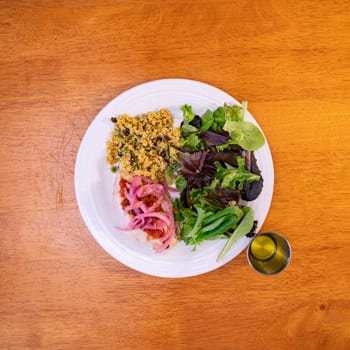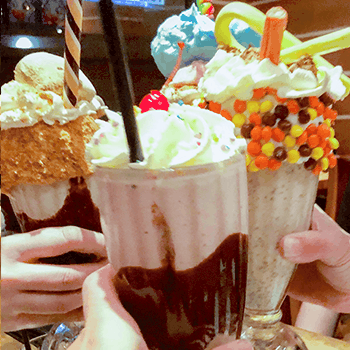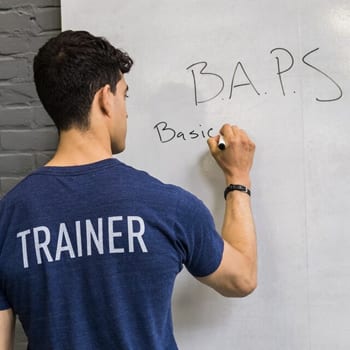If you’re like most people, you’ve done a few diets in your lifetime. Many folks have done dozens.
In fact, many of these diets probably “worked” for you in the short term—8 weeks, 12 weeks, sometimes maybe even six months. Then, at some point, it all came apart. You “fell off the wagon,” stopped following the diet, and gained back whatever weight you had lost. Often, people gain back more than they had initially lost.
 Most people follow this cycle of diet failure for years, or even decades. It’s demoralizing.
Most people follow this cycle of diet failure for years, or even decades. It’s demoralizing.
The diet world would tell you that, ultimately, you failed because of a lack of willpower. That you just didn’t have the herculean determination that “really fit people” have. You know, the diet industry likes to say that kind of crap.
The reality is actually even simpler: If you failed at a diet, you failed because of either a lack of flexibility or a lack of skills. Both of those things can be fixed with practice.
Developing skills and flexibility, in contrast to a diet, can feel like more work in the short term. It takes time and practice to develop skills—if you’ve done Elements or Mobility, or have learned any movement skill, you know that it takes time.
Eating skills are like that too—they take time and work to develop. Unlike diets though, skills get easier over time. Anything you’ve ever practiced, you’ve gotten better at over time. Eating skills are the same. Your initial investment of effort and practice will serve you for a lifetime.
To understand why you probably don’t want to diet anymore, paradoxically, it can be useful to look at what worked about the diet initially.
Why a Diet “Worked” for You (in the Short Term)
 Most diets work for a few simple reasons:
Most diets work for a few simple reasons:
- You ate more vegetables
- You ate more protein
- You ate whole foods that are generally more satisfying
- You paid attention to portion sizes
- The diet limited your options and decision making
That’s literally it. That’s what they all have in common. And those things can work.
All of the other things you’ve ever read about one diet versus another diet is the stuff that makes no difference. It doesn’t matter if you eat after 7pm; it doesn’t matter if you avoided a magic food; you didn’t need a magical ratio of macros. Almost all of the differences between diets are the things that you can actually completely disregard. Just like intermittent fasting shortens your eating window, it’s pretty much the same when compared to other diet strategies.
More Vegetables and Protein
The things that all diets have in common are generally good ideas. It actually works really well to eat more vegetables. Vegetables are super healthy and they’re really filling. Adding more protein is great for strength and being leaner, and it’s really satisfying. Both vegetables and protein, besides being healthy, have a huge benefit of having you feel way more full.
Whole Foods
Eating whole foods is generally more filling and satisfying than eating processed foods. But that’s the only magic: Fullness.
- When people eat processed food, they eat more calories and feel less full.
- When people eat whole foods, they eat fewer calories and feel more full.
No matter what you’ve been told about some foods being “clean” and other foods being “dirty,” the game really is just that whole foods are more satisfying.
And yes, you should eat some vegetables and fruit because they’re healthy. That’s it. Simple.
Portion Sizes
 Paying attention to portion sizes, in some manner of speaking, makes a difference. Losing weight is the result of eating less food energy, gaining weight is the result of eating more food energy. That’s it.
Paying attention to portion sizes, in some manner of speaking, makes a difference. Losing weight is the result of eating less food energy, gaining weight is the result of eating more food energy. That’s it.
It has nothing to do with carbs being evil, or time of day (you aren’t a gremlin), or gluten being terrible, or any of those things you’ve been sold. The research does not support that any of those things make any difference at all, when protein and calories are matched (see here).
Spare me that thing you heard about what keto did in rat studies—it makes no difference with humans. We have robust randomized controlled trials, conducted in locked metabolic wards, to know that. It may hurt to hear, but there are no magic macronutrients. They were wrong about fat in the 1990s and they’re wrong about carbohydrates now (see here, here, here, here, and here).
Portion sizes matter. The snacks between meals matter.
Limiting Decision Making
Limiting options and decision making works because we all want life to be simple. We actually don’t want to spend a whole lot of time worrying about food. Unfortunately, if you’ve ever done a diet before, you know that what feels like it simplifies things in the beginning can become a real bear over time. Most people end up spending more time worrying about food.
It starts to become exhausting trying to fit the diet rules into the ever-changing demands of your life. It becomes impossible when you get into a social or schedule situation where you don’t have any options that fit your diet rules.
Of the things we’ve listed so far that “work” about diets, this is for sure the one you want to ditch.
Why Diets Have Stopped Working for You (in the Long Term)
 Diets don’t work for a few simple reasons:
Diets don’t work for a few simple reasons:
- They’re inflexible
- They ruin your relationship with food
- They ruin your relationship with your body
- You didn’t have the underlying skills to make it work
- You’re in the percentage of the population for whom diets will never work long term
Let’s take a look at each of these reasons.
Inflexibility
Diets are easier in the beginning because they constrain your choices. It feels good to know exactly what to do, and having so many foods off-limits actually cuts out a lot of crap food that most people eat. That’s why it “works” so well in the short term.
Unfortunately, those same rigid constraints are why diets fail in the long term—at some point you’ll have a social event, a vacation, a really stressful week, you’ll get sick, something will come up where you can’t follow the rules.
And diets are always black and white, you either follow the rules or you fail. That’s why, with a diet, the longer you’re on the diet the bigger your chances of failing are.
It’s not a matter of if, but when—when you have a life event that doesn’t fit in with your diet rules, the diet is going to fail you. There will be a time when your life is too busy to do the food prep and fill all of the Tupperware containers on Sunday. There will be a time when you want to go to a wine tasting. There will be a time when your in-laws come to visit and don’t want to eat your diet food. There will be a time when your kids get sick.
Things come up, whether good or bad, that don’t fit your diet rules. And then you fail.
And don’t get me started on free-days. The cycle of rigid diet restriction and free days can start to look a whole lot like disordered eating, really fast.
The restrictive days keep getting more restrictive. The free days keep getting bigger and bigger. Pretty soon, you feel terrible under-eating all week, then you feel gross massively over-eating on your free day. It doesn’t feel good either way. It’s an unhealthy relationship to food, both ways. It can give the illusion of flexibility, but it’s really rigidly too little and rigidly too much, just at different times.
Diets Ruin Your Relationship With Food

If you think there’s something wrong with enjoying a delicious plate of french toast from time to time, that’s a good sign diets have negatively impacted your relationship with food.
Diet rules are bad for your well being.
The more you moralize food as “good or bad” or “clean or dirty,” the less healthy your relationship to food is. You’re hurting your wellbeing by treating food as a pass/fail system of whether or not you are a good person. Food isn’t moral (see here, here, and here).
The question always comes up then, about whether quality of food matters. It matters for your health and it matters for fullness, but the spectrum is much wider than you’ve been led to believe.
There aren’t any foods that are always horrifyingly bad or miraculously good. Instead, just know that getting some vegetables once in a while is good for you. Whole wheat bread has a little bit more fiber than white bread. Having a doughnut once in a while is probably fine, even though having a doughnut twice-a-day, every day, might not work for some of your goals.
If a person believes that the world comes crashing down with one meal that isn’t the perfect balance of macronutrients, or doesn’t include something on the “magic good food list,” that belief has nothing to do with health or fitness, that’s just diet perfectionism. People who are diet perfectionists are people who quit a lot.
Quitting “because it wasn’t perfect” is just an excuse to quit. The guilt that comes with quitting, followed by the rush that comes with starting again next week, is a really unbalanced way to live.
Diets Ruin Your Relationship With Your Body
One of the coolest things that comes up in research on eating behavior is that people who do skill-based eating have a better relationship with their bodies than people who use rigid diet rules.
I was pretty surprised the first time I read about this, but it actually makes sense: If you are learning to listen to and trust your body about hunger and fullness, and you can distinguish between hunger and stress, of course you’ll have a better relationship with your body. You’re getting on the same team with your body. On the flip-side, if you are constantly forcing hard rules onto it, regardless of what it needs, of course you are going to have a permanently adversarial relationship with your body.
Don’t get me wrong—this isn’t the end-all-be-all of body image, it’s just a piece. But it’s an important piece: Diets put you at odds with your body. Skills put you on the same team as your body.
Diets Don’t Work for You

If you do this for a living, that’s a totally different ballgame. Most of us don’t fall into that category.
The people who do well with diets are usually people who:
- Don’t ever emotionally eat
- Don’t ever snack when they’re bored
- Have never had an issues in their relationship with food
- Have never had any issues in their relationship with their body
- Already possess all of the eating skills required to be successful
Those people TOTALLY exist. You might even know some. It’s really cool for them! But if that’s not you, then you need to stop trying to do the diets that they do.
The other types of people who do really well at diets are people for whom their professional career depends on it. These people are:
- Personal trainers
- Professional athletes
- Celebrities
They often have an entire staff and support structure that you probably don’t have.
It’s important to acknowledge that those people exist. You have to realize, first, that they are out there, and second, that you (if you are reading this) probably aren’t one of them. They might have won some sort of lottery in terms of how their parents raised them around food, or they picked up eating skills watching someone else. For them it’s all normal and easy. That’s cool.
We need to stop trying to do what those people do. We aren’t them. We need something smarter and more advanced than diets.
How To Do a Nutrition Program Without Backsliding Again
Alright, now we’re into the fun part: How to actually do well with your eating, and continue to do well for the long term!

If you have only done diets in the past, you may be wondering what it looks like to not follow rigid rules. Like, what do skills and flexibility look like?
Skills
Some skills you could work on would be:
- Notice when full and stop eating
- Distinguish between stress and hunger
Noticing when full is a lifelong practice, with multiple sub-skills that you could work on, progressively, over weeks and months (like we teach in our Eating Skills program).
The basic idea though is very simple: Pay attention.
At a couple different points within the meal, check in with your stomach. Look at your plate and your food and notice how much you have. Be mindful of all of the flavors you are eating and be present with your food. Try to guess if this will be the right amount of food for you to feel satisfied for the next few hours. If it seems like too little, get more. If it seems like too much, stop eating. Self-check later and hone in your skill.
Distinguishing between stress and hunger is also a dedicated practice, and takes time and lots of repetition.
But it still comes down to checking in with yourself and seeing if you want this food because you are stressed out or if you want it because you are actually hungry. You can pause for a minute and notice what’s going on for you: Are you stressed out? Tired? Procrastinating? Sad? Frustrated? Bored? Any of those things might be showing up as wanting food, but distinguishing those feelings from true hunger puts you in the driver’s seat.
Flexible Guidelines
 Some flexible guidelines you could work on could be:
Some flexible guidelines you could work on could be:
- Plate some version of a balanced meal
- Plate food that is more or less whole food
- Have enough food at meals, and don’t snack between meals
The coolest thing about guidelines is that they are inherently flexible. If you’re plating some version of a balanced meal, then that’s all you do—you try to get some amount of vegetables, protein, carbohydrates, and fat on your plate, most of the time.
Let’s get real—if most people just added a little bit of vegetables it would be a huge step up. So get some vegetables when you can, but don’t stress too much if you can’t. Try to get enough protein to support strength and fitness, but if one meal is a little low, no worries, make it up over other meals throughout the day or week. Get fairly whole food carbohydrates and healthy fats in there.
And if a given meal isn’t perfect, that’s okay, you’re just trying to get as close as possible. That’s actually enough.
Really, just having a good amount of vegetables is more important than 99% of the details you’ve been sold by the diet industry. Just getting enough protein over the course of the week is enough. Where the Eating Skills program does have (slightly) more directive guidelines, they’re still just guidelines.
Plate more or less whole food. This is one that people get really hung up on, as if every fitness goal they have ever had will explode if they have a serving of pasta instead of a serving of quinoa. Really, get some vegetables in there, and either one is fine. “Whole food” is, at best, a continuum. At worst, it’s a made up distinction.
Look, if you eat carbohydrates that are obviously healthy, like whole wheat bread, brown rice, quinoa, sweet potatoes, potatoes, and so on, you’re fine. That gives you lots of options. But you won’t die if you have white bread or pasta, just put that white bread or pasta in a balanced meal with some protein and vegetables. Similarly, it’s great if you get a lot of your fat from fish or olive oil or almonds or avocado, but the world won’t end if you have some bacon sometimes.
Having enough food at meals, and not snacking between meals, can be game-changing for people.
Most of the most processed and unbalanced food people get are snacks. Most of the extra calories they consume when they aren’t hungry at all are snacks. Research shows that snacking has no impact on how much food people eat at meals—it’s just extra. So, for many people, the biggest issues aren’t what they eat at meals, but all of the snacks they eat between meals.
Again, these snacks usually have little to do with hunger, and mostly have to do with being stressed out or bored or tired.
Of course, the exception is if people chronically under-eat at meals. Like, they eat a salad for lunch that has nothing to it, then of course they are hungry in the afternoon, and that’s when “can’t stop themselves from having the candy.” Of course they can’t—they didn’t have anywhere near enough food for lunch. So, it starts with eating enough at meals, and then you have a guideline that you mostly don’t snack.
As always, a guideline is not a rule; rather, it’s a framework to make your skills easier for you. So, if you pause for a moment, check in with yourself, and find that you are truly hungry, you eat a snack. Because it’s not a rule, it’s a guideline.
Skills and Guidelines are Inherently Flexible
As you can see, it’s the rigidity of diets that causes people to fail. Diets are too rigid to fit into a real life, so you need a plan that has flexibility built in. Again, it’s not a free for all with no structure—you still need a plan. You still need skills and guidelines. And you still need to plan and track your skill and guideline practice.
The skills and guidelines above can ebb and flow with your actual life. When you are out at a restaurant, you can order something close to a balanced meal, and you can notice and stop when you are full. When you get busy at work, even if you have to go out to get fast casual food for lunch, you can still work on not snacking between meals. You can use one or more of the skills and guidelines in nearly any situation you are in. You always have some tools to be in the driver’s seat with your eating, and that’s what autonomy looks like.
You have choices, you are the one making the choices, and you can make smart choices in any situation.
This is About Autonomy
You have multiple things that matter to you in life. Your health as it relates to food and fitness is one of those things, but it isn’t the only thing. With all of the different commitments in your life, you need to have some structure (like guidelines and skills), but you need to be able to have that flow with what’s actually going on.
The kind of self-directedness you are looking for with your food is about doing what matters to you, inside of the context of all of the things that matter to you. It’s about having the right amount of structure.
Having the skills and guidelines you need will put you in the driver’s seat with food in your life. The only way to be successful, long term, is to have the skills to manage multiple different kinds of situations, and adapt to the ever changing demands of your life. Diets will never be able to do that. Skills and guidelines are the answer.
Build Skills that Last
Eating Skills is a coaching experience that will help you build sustainable skills around how you eat, giving you a healthy, non-dogmatic approach to food.


